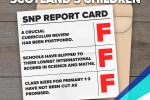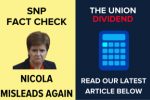On many issues related to COVID-19, the Scottish Conservatives have challenged the SNP Government and made a real difference for ordinary Scots:
- Thanks to the Scottish Conservatives, at least 14,300 businesses will pay nothing in business rates for the whole of 2021-22. In the first draft of their budget the SNP failed to listen to businesses and extend 100 per cent relief from non-domestic rates for retail, hospitality and leisure businesses for the whole of 2021-22. However, we won a vote in Parliament calling for relief to be extended for 12 months. Days later the SNP relented and extended the relief. According to the SNP Government’s own statistics there are 14,365 businesses in the ‘Accommodation and Food Services’ sector that will be eligible for relief (Scottish Government, Budget Statement 2021-22, 28 January 2021, link; Scottish Government, 16 February 2021, link; Scottish Government, Businesses in Scotland: 2020, Excel Table 7, 11 November 2020, link; Press Association, 10 February 2021, link).
- We forced the SNP to U-turn over their disastrous 2020 exam results. We backed a motion of no-confidence in SNP education secretary John Swinney over his grades model that punished pupils who lived in poorer areas. Swinney announced that awards would be based on teacher estimates two days before the vote to save his job. (Official Report, 11 August 2020, link; 13 August 2020, link).
- We pushed the SNP to start publishing daily vaccination figures. Sturgeon finally agreed to publish daily vaccination figures starting on Monday 11 January after repeated calls from the Scottish Conservatives. It has proved vital in holding them to account. (The Herald, 6 January 2021, link; Glasgow Times, 7 January 2021, link).
- We demanded and secured a commitment to routine testing in care homes – and held the SNP to account when they didn’t meet it. On 28 April, we demanded that Sturgeon introduce routine testing of care home staff. The SNP Government announced three weeks later on 18 May that regular testing of care home staff would take place. On 3 and 10 June, Jackson Carlaw challenged Sturgeon on the fact that this testing was not taking place. (Official Report, 28 April 2020, link; STV News, 18 May 2020, link; Official Report¸ 3 June 2020, link; 10 June 2020, link).
- We defeated the SNP Government in Parliament over the care home scandal, passing a motion calling for an immediate public inquiry. We repeatedly raised the scandal of patients being discharged from hospitals to care homes without coronavirus testing or after positive test results. On 4 November, our motion was passed by the Scottish Parliament calling for ‘the Scottish Government to hold an immediate public inquiry to find out what happened in Scotland’s care homes during the course of the pandemic’. (Official Report, First Minister’s Question Time, 27 May 2020, link; Decision Time, 4 November 2020, link).
- We confronted the SNP over their lack of support for the oil and gas industry after the oil price crash. On 28 April, we raised this issue in Parliament, stating ‘Last week, the First Minister said that she would consider support for the north-east. Ministers have had the opportunity to consider what could be done. Can she confirm to people in the vital oil and gas sector who are worried about their jobs…what action the Scottish Government might now take?’ Over six weeks later on 12 June, the SNP Government finally announced a support fund for the energy sector. (Official Report, 28 April 2020, link; Scottish Government, 12 June 2020, link).
- We demanded that vital funding was handed on to local councils who were on the frontline dealing with the virus. On 18 April, the UK Government confirmed an additional £155 million for the Scottish budget as a result of extra funding for local authorities elsewhere in the UK. We raised the delay in the SNP Government passing this on to councils in Parliament on 30 April and several times thereafter. Eventually the money was paid in full to councils over nine weeks later on 24 June. (UK Government, 18 April 2020, link; Official Report, 30 April 2020, Local Government Funding, link; The Herald, 5 June 2020, link).
- We forced the SNP to expand business grants. On 9 April, we called for Sturgeon to deliver her promise of offering business grants per property rather than merely per business. On 15 April the Scottish Government announced that additional grants worth 75 per cent of the value of the first would be available for additional properties. This was an improvement but did not live up to Sturgeon’s promise that ‘grants of up to £25,000 [will be] available to eligible properties in the retail, hospitality and leisure sectors’. We called for the remaining gaps to be addressed on 21 April. (Official Report, 1 April 2020, link; Official Report, 9 April 2020, link; Scottish Government, 15 April 2020, link; Official Report, 21 April 2020, link).
- We won a hardship fund for struggling landlords. On 1 April, Murdo Fraser raised the financial difficulty individuals would suffer if rent was their primary source of income, calling for a hardship fund to be established for landlords in that situation. On 5 May, the Scottish Government announced such a fund. (Official Report, 1 April 2020, link; Scottish Government, 5 May 2020, link).
- We won business rates relief for newspapers. Murdo Fraser passed an amendment at Stage 3 of the Coronavirus (Scotland) (No 2) Bill that extended the Non-Domestic Rates (Coronavirus Reliefs) (Scotland) Regulations 2020 to include the production of newspapers. Following a Conservative Party Business debate on this issue in February, we also won rates relief for 2021-22 when the SNP Government were forced to extend it for another year (Official Report, 20 May 2020, Stage 3, Amendment 84, link; Official Report, 10 February 2021, link; Scottish Government, 16 February 2021, link).
- We reinstated freedom of information laws that were curtailed by the SNP. At Stage 2 of the Coronavirus (Scotland) (No. 2) Bill, we united with other opposition parties to propose and pass amendments that would roll back the SNP’s extensions to time limits on freedom of information responses. (COVID-19 Committee, Stage 2 Proceedings, Amendments 11-13 and 14, link).
And on a whole host of other issues in the last five years we have forced the SNP to change course
- We twice defeated the SNP Government in Parliament over their refusal to publish legal advice on the Salmond case. Our two votes in Parliament increased the pressure on Sturgeon and Swinney to release the advice of their lawyers on Salmond’s judicial review case – which is at the heart of explaining how the SNP wasted £500,000 of taxpayer’s money. (Official Report, Decision Time, 4 November 2020, link; Official Report, Decision Time, 25 November 2020, link).
- We successfully campaigned on Frank’s Law to give free personal care for under 65s with dementia. Miles Briggs called for the introduction Frank’s Law in December 2016, which was then included in the SNP Government’s 2017-18 Programme for Government. Frank’s Law finally came into effect on 1 April 2019 (The Scottish Sun, 29 December 2016, link; Nicola Sturgeon Programme for Government Speech 2017-18, 5 September 2017, link; Scottish Government, 1 April 2019, link).
- We secured £20 million a year for drug rehab facilities which will save lives. The measures were announced as part of a £250 million package over 5 years, aimed at tackling Scotland’s shocking drug death figures. The Scottish Conservatives called for more funding for rehab and recovery in 2018 and specifically for a £20 million fund in December. (The Herald, 14 December 2020, link; Daily Record, 20 January 2021, link; Scottish Conservatives, 27 November 2018, link).
- We pressured the SNP into abandoning their plans for an intrusive named person scheme. After our extensive campaigning, the SNP were forced to abandon this controversial and unworkable scheme in 2019. (Scottish Government, 8 September 2016, link; BBC News, 19 September 2019, link).
- We forced the SNP to abandon their merger of the British Transport Police and Police Scotland. Since July 2015, we have stood with the officers and experts against the SNP’s dangerous plans to abolish expert railway policing. Just months before it was shelved, Liam Kerr led a debate calling for the SNP to pause their merger plans. In February 2018, the SNP delayed the merger date beyond April 2019. Then in September, Humza Yousaf said he would explore options that didn’t involve breaking up the force. (The Scotsman, 19 September 2018, link).
- We forced the SNP to amend their dangerous hate crime bill. While the amendments to the chilling ‘stirring up hatred’ offences didn’t go far enough, they were a step in the right direction. The changes came after months of sustained opposition from Douglas Ross and the Scottish Conservatives, including a Parliamentary debate where we called for the whole bill to be dropped. (Official Report, Hate Crime and Public Order (Scotland) Bill, 9 September 2020, link; 23 September 2020, link).
- We pushed the SNP to toughen sentences for animal cruelty – and to protect service animals like police dogs. We joined animal welfare charities in calling for the maximum sentence for animal cruelty to be increased to five years in 2018. We also campaigned hard alongside PC Dave Wardell for Finn’s Law so that those who cause pain and suffering to police dogs will be dealt with severely by the law. Both were made law in 2020. (The Sunday Post, 6 April 2018, link; Scottish Conservatives, 4 September 2018, link; Environment, Climate Change and Land Reform Committee, Stage 1 Report, 10 February 2020, link).




